Cécile’s Short Videos N°2
I have never lost HOPE that my dream will come true (in French)
https://www.tiktok.com/@cecisuisse/video/7192678534890982661?refer=embed
I have never lost HOPE that my dream will come true (in French)
https://www.tiktok.com/@cecisuisse/video/7192678534890982661?refer=embed
A new study published in “Frontiers in Psychology” investigated the different teaching variables which affect the inclusion of students with rare diseases. In education, as in other fields, those students have specific needs. These needs are often unmet, due to a general lack of education of teachers and the wide variety of rare diseases. Data collected from the questionnaire filled in by teachers in La Mancha (Castille-Spain), shows that while they were in favor of including students with rare diseases, as a whole, they lacked the requisite knowledge about their specific needs. These results indicate that specific training and resources to offer bespoke educational responses to students with rare diseases are needed. If teachers are more aware of the specific challenges facing these students, their needs will be better addressed and their wellbeing will be improved. (orphanews 2023.01.31)
What is Cutis Laxa (in French)
https://www.tiktok.com/@cecisuisse/video/7195529085227977990
13th January 2023 :
ERN-Skin Board Meeting.
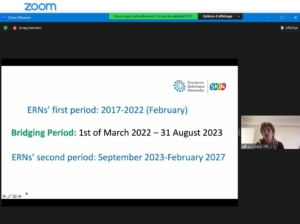
2023 is a transitional year for all ERNs.
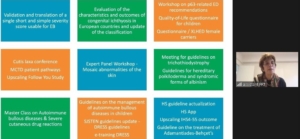
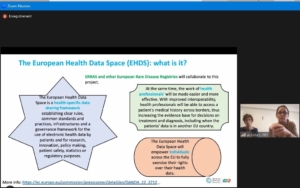
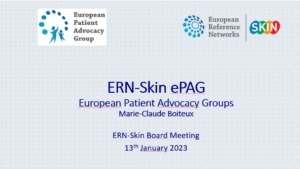
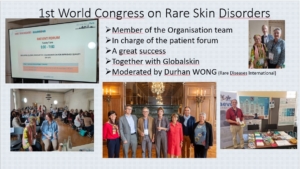
The first 5-year period ended in 2022. 2023 will therefore be a transition and evaluation year before a new validation by the EU for a new 5-year period to 2028.
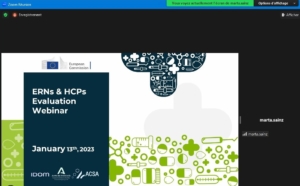
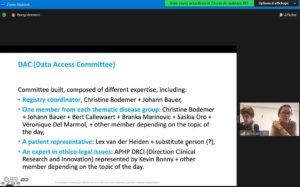
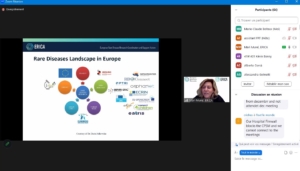
The meeting was an opportunity to take stock of what was done and present future projects.
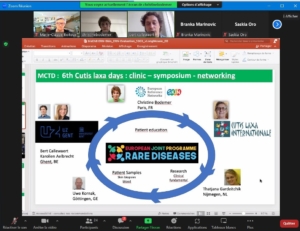
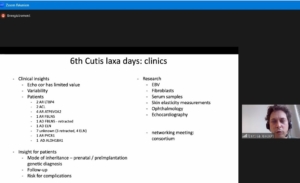
Adamo et al. describe a cutis laxa syndrome caused by bi-allelic loss of-function variants in EMILIN1 characterized by arterial tortuosity, aneurysm formation, and osteopenia. They provide a model in which EMILIN1 connects elastic fiber network with collagen fibril formation, relevant for both bone and vascular tissue homeostasis.
New video
Cécile was interviewed by #Tibo InShape on his youtube page.
A very serious, but joyful, moment that also allowed us to open an online funding page
https://www.leetchi.com/c/cutis-laxa-international
I am so very sad to announce that Eric MOLINIE left this world on 21st December 2022.
Eric was former chair of AFM-Téléthon in France. He was himself diagnosed with Duchenne Myopathy.
He is the one who made it possible for Cutis Laxa to be known and research be done.
We had explained to Eric that without enough known patients research would never be done on such a rare disorder. He had promised that if we knew at least 10 patients, AFM-Généthon would start a research.
In december 2001, Cécile took part in the French Téléthon for the second time. At that time, we knew of 9 patients in France and abroad. Cutis Laxa International was just 1 month old, being set up on 11th November 2001.
We were on stage, live, explaining that 10 patients were needed, at least, to start a research, when Eric quickly rolled his wheelchair to join us, saying that a 10th patient had called the AFM and that, keeping his promise, Genethon will start a research project.
And on February 2002, it started.
We were all crying on stage. And still today, 20 years later, this memory brings me tears and shivers.
Thank you Eric, Without you the 520 patients we know of today would not have research going on giving them hope for the future.
Thank you Eric, for staying faithfully at our side during all these years.
Rest In Peace dear Friend
Watch the videos of all the presentations (in French)
Cutis Laxa Internationale now gathers 517 patients coming from all parts of the world:
Stacy, Amber, Ayse, Celia, Deacon, Emmy, Scott, Anna, Em, Amelie, Patricia, Yousef, Nora Grace, Warisha and Nicole joined us since our last newsletter.
Our Big Cutis Laxa Family is glad to welcome them and give them all the help and support they need.
Very sadly I need to let you know that two of our members passed away : Anaaya, 3 ½ , in India and Dominique, 51, in France. Again, we send our deepest condolences to their families. May they Rest in Peace.
As war still goes on, Ukraine faces a humanitarian crisis and rare disease patients are the most affected by the conflict. 2 million Ukrainians have a rare disease and face the sizeable challenge of meeting the complex medical needs on their own.
The EU, Eurordis, ERNs, Orphanet and all the members of the European rare diseases sector joined forces and organized everything to give displaced Ukrainian patients the best help they could: list of medical centres abroad, safe transfer of patients across Europe, access to medicines and medical equipment in Ukraine despite the destruction of vital infrastructures, list of rare disease resources for refugees and displaced persons, and much more, see
This site uses cookies. By continuing to browse the site, you are agreeing to our use of cookies.
OKLearn moreYou can read about our cookies and privacy settings in detail on our Privacy Policy Page.
Privacy Policy